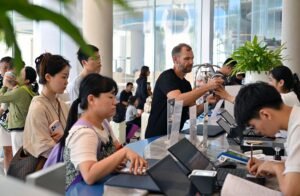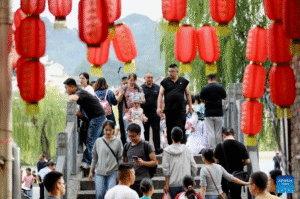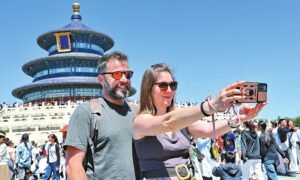Hiroshima marks 75th anniversary of A-bombing

KYODO —-
Hiroshima marked the 75th anniversary of its atomic bombing by the United States, with its mayor urging the world to unite against grave threats to humanity — be they nuclear weapons or the coronavirus pandemic — by spurning nationalistic and isolationist policies.
At a time when tensions between some world powers have heightened over the origin of the virus and geopolitical rivalry in the face of the global economic slowdown, Hiroshima Mayor Kazumi Matsui said countries should put aside their differences and come together to overcome both man-made and natural challenges.
“Civil society must reject self-centered nationalism and unite against all threats,” he said at the annual ceremony at Peace Memorial Park near Ground Zero, which was scaled down drastically due to a recent spike in infections in Japan.
After a moment of silence was observed at 8:15 a.m., the exact time of the bombing on Aug 6, 1945, Matsui said the city recovered as a result of people working closely not to repeat its tragic past.
“Hiroshima considers it our duty to build in civil society a consensus that the people of the world must unite to achieve nuclear weapons abolition and lasting world peace,” he said.
In his speech, Japanese Prime Minister Shinzo Abe said each country must step up efforts to “remove a sense of mistrust through mutual involvement and dialogue,” amid the severe security environment and widening differences between nations’ positions on nuclear disarmament.
Appearing at his 10th ceremony as mayor, Matsui also called for the government to sign and ratify a U.N. treaty to ban nuclear weapons to “enhance its role as mediator” between nuclear and non-nuclear-weapon states.
Japan has refused to participate in the Treaty on the Prohibition of Nuclear Weapons, which was adopted in 2017, along with the world’s nuclear-weapon states as it sits under the U.S. nuclear umbrella.
Abe did not refer to the treaty in his speech but said it is Japan’s duty, as the only country that has suffered atomic bombings in war, to continue working toward the abolishment of nuclear weapons.
In a video message, U.N. Secretary General Antonio Guterres, who had to cancel his initial plan to be part of the event due to the pandemic, said, “The only way to totally eliminate nuclear risk is to totally eliminate nuclear weapons.”
The ceremony was held with a limited number of guests with seats spread apart to maintain social distancing.
However, about 80 countries and the European Union sent representatives to the event, roughly the same number as in recent years.
A uranium-core atomic bomb named “Little Boy” dropped by a U.S. bomber exploded above Hiroshima 75 years ago, killing an estimated 140,000 people by the end of 1945.
A second atomic bomb was dropped on Nagasaki on Aug 9, and Japan surrendered six days later, marking the end of World War II.
The combined number of hibakusha, or survivors of the two atomic bombings, stood at 136,682 as of March, down about 9,200 from a year earlier, the Ministry of Health, Labor and Welfare said, adding their average age was 83.31.
The city government of Hiroshima has enrolled a further 4,943 people in the past year on the list of people who died from the atomic bombing, bringing the death toll to 324,129.
Before the ceremony, many people visited the park to offer prayers and flowers to those that suffered as a result of the bombing.
The 75th anniversary came at a time when the global health crisis has prevented some countries from cooperating closely, with the confrontation between China and the United States, both major nuclear powers and the world’s two largest economies, especially escalating.
August 6 , 2020
Image : Japanese Prime Minister Shinzo Abe walks off after delivering a speech at the Hiroshima Peace Memorial Park on August 6 . Photo: AP/Eugene Hoshiko














